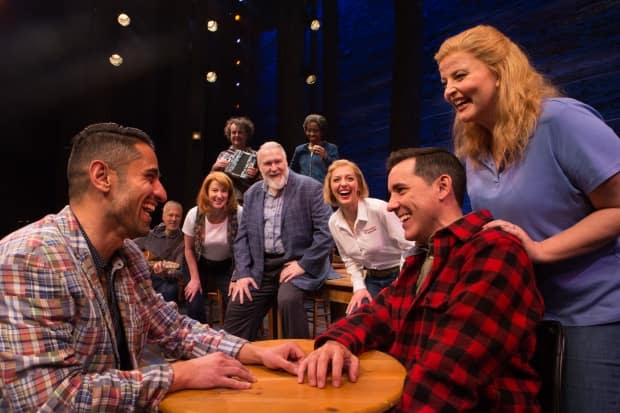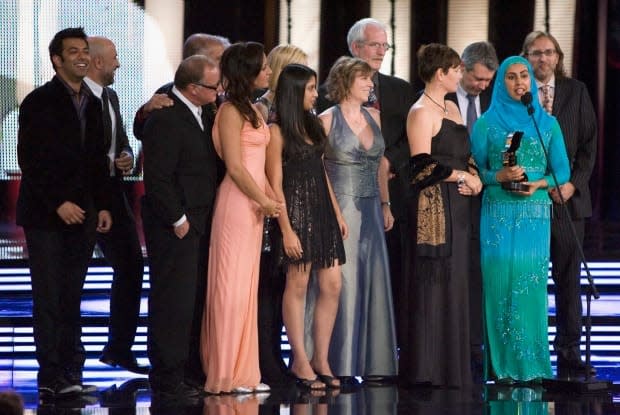The fight for Muslim representation in Hollywood — and the danger of falling behind

Last week, Emmy-winning actor and the star of last year's music-biopic Sound of Metal, Riz Ahmed, made a grim observation. Looking at the dismal record of Muslim representation in film, he traced a direct connection between what we see on screen and the treatment — or mistreatment — of Muslim members of society.
He did so while introducing the Annenberg Inclusion Initiative study, Missing & Maligned. Among other things, that study found that less than two per cent of speaking characters in major films released between 2017 and 2019 were Muslim. It also found that more than one-third of those characters were depicted as "perpetrators of violence," while more than half were shown to be victims of it.
It's far from the first time Ahmed has spoken out about representation. But with the release of this study, he and others sounded the alarm about the potential of real-world impact from a lack of — or negative type of — representation of Muslim people in media.
"Isn't it tragically a case of just math that you end up with the massacre of three generations of one family," Ahmed asked in a followup video shared on Twitter. He was referring to the recent attack in London, Ont., of a family who investigators say were targeted due to their Muslim faith.
WATCH | The fight for better Muslim representation in Hollywood:
"This is the result of dehumanizing and demonizing portrayals of Muslims.... The Islamophobia industry is one that measures its cost in blood."
The report itself had a similar finding. The authors wrote that "the violence against Muslims — online and offline — demonstrates dangerous biases in the population and real threats to individuals in this community."
"While the causes of such violence are complex, one arena that may exacerbate biased views of the Muslim community is the mass media. In the absence of direct contact, entertainment may provide individuals with information about different groups."
And in an interview with CBC News, one of the study's authors, Al-Baab Khan, also shared concern over how stereotypes and "terror tropes" associated with Muslim people in media can influence their treatment. As an example, she pointed to the fact that nearly 75 per cent of Muslim characters in the study were shown wearing religious-affiliated clothing.
"It's decisions like this that really may perpetuate seeing Muslims as being other, or seeing Muslims as not being part of Western cultures," she said.
Khan and Ahmed aren't the only ones who believe it's important to increase, and improve, Muslim representation in the media. CBC News spoke with three creators about their experiences in the industry and where it needs to go from here.
WATCH | Ali Momen on the difficult choices he faced as a Muslim actor:
Despite finding success as an actor — both in film and even eventually starring in the play Come From Away — Toronto's Ali Momen doesn't look back fondly on his first major role. Even though it was a stepping stone into the career he now holds, it's a bittersweet memory, he says, and speaks to issues endemic to the entertainment industry.
"In hindsight, I deeply regret it," Momen said in an interview, recalling that role. "In hindsight, I go, 'I wish I never said yes.'"
That role was as "suicide bomber No. 3" in the 2008 Don Cheadle movie Traitor. Momen's regret, he says, comes from the fact that those types of roles — which depict Muslims as violent or perpetrators of terrorism — are grossly overrepresented and continue to influence audiences' real-world opinions.
"Think about this: The belief that we have, that you can walk into a coffee shop, stare into the distance, meet somebody and — just through a look — fall in love and begin the journey of happily ever after," Momen said.
"[It's] a construct and an idea of love, of art. And it is still perpetuated in the music we listen to, in the movies we see, in the books we read.
"So if art can teach us how to love, art indeed can teach us how to hate."

Since that role in Traitor, Momen says he's had similar experiences but has since decided to only accept gigs — and direction — he can be proud of.
That's because there is so little opportunity for positive representation, he says, that the negative examples do an outsize amount of damage.
"It otherizes you," he said. "And even when there is a Muslim representation that isn't terrorists or nefarious, it's exoticized."
WATCH | Negative on-screen depictions have real-world consequences, says filmmaker Maissa Houri:
Ottawa filmmaker Maissa Houri says that is something she's familiar with. Although she describes herself as a "non-practising Muslim," whenever she went out for auditions, she says she was only put up for two types of roles.
"It evolved from, you know, the terrorist roles to the refugee roles," Houri told CBC News. "So last year, most of my Middle Eastern auditions were refugee roles — almost like 99 per cent of them were refugee roles."
To keep up, she needed to check with her mother on the fake accent she would have to put on, while yearning to see more representation of people like her on-screen.
"There's nobody on TV like me," she said. "I never felt represented watching anything, and it was frustrating — you know, I'm not a covered Muslim, and there's none of that."
It's an experience "any Muslim or MENA [Middle Eastern and North African] actor," will attest to, she said. So instead of continuing to audition for roles, she began creating her own — eventually releasing her own web series, Dirty Love.
But aside from her desire to see people like herself on-screen, Houri says it's important to increase diverse depictions of Muslim people for the sake of those who otherwise do not interact with — or know — any Muslim people.
"People who've never met a Muslim before, they'll watch the news and they'll watch these films or television shows," she said, "and that's what they think. And they think we're the enemy."
WATCH | Consul General Zaib Shaikh on importance of representation in media:
Before Zaib Shaikh became the consul general of Canada in Los Angeles, he, too, was an actor. He starred in, and later became a consulting producer for, the 2007 Canadian sitcom Little Mosque on the Prairie.
Before its release, the show incited extensive coverage because, as the New York Times wrote, it challenged "whether Canadians and Americans can laugh about the daily travails of those who many consider a looming menace."
While the show did see success, for Shaikh it was bittersweet.
"It continues to have its legacy and its reverberations, but it was a lonely place," Shaikh said, as it was one of the only shows to "push the boundaries of what it meant to be ... a Canadian community."

But despite the show's success, problems still remain.
"Clearly it wasn't enough, and nothing really enough happened from the reverberations," he said. "Because if it did, we wouldn't be having these reports showing such stark disparities in representation."
He now works more behind the scenes — including aiding in the creation of the Canadian Creative Accelerator, an initiative that seeks to support BIPOC Canadian creators in Los Angeles through mentorship and financial backing.
Shaikh said programs like that, and reports like the Annenberg study, are vital to continue to change the tide of representation.
"It's so important to realize that, yes, change is around the corner and change is happening," he said.
"We need information like this, because it actually does prove what those of us already feel, know and have experienced."

 Yahoo Movies
Yahoo Movies 